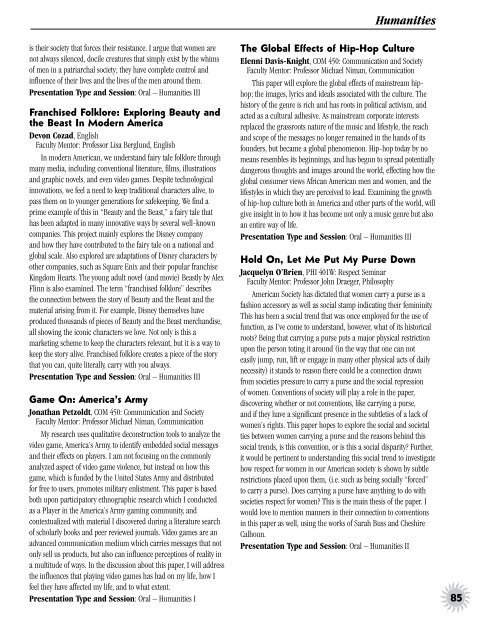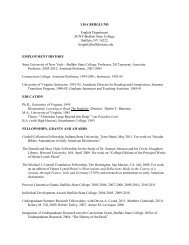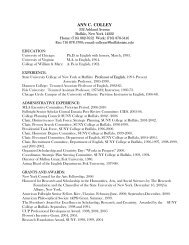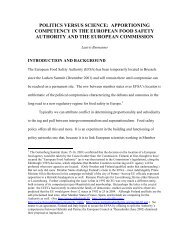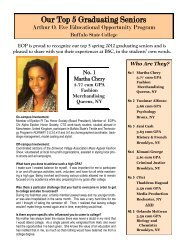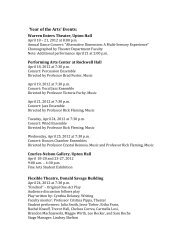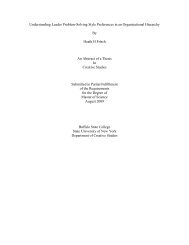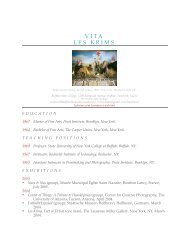Arts - Buffalo State College
Arts - Buffalo State College
Arts - Buffalo State College
You also want an ePaper? Increase the reach of your titles
YUMPU automatically turns print PDFs into web optimized ePapers that Google loves.
is their society that forces their resistance. I argue that women are<br />
not always silenced, docile creatures that simply exist by the whims<br />
of men in a patriarchal society; they have complete control and<br />
influence of their lives and the lives of the men around them.<br />
Presentation Type and Session: Oral – Humanities III<br />
Franchised Folklore: Exploring Beauty and<br />
the Beast In Modern America<br />
Devon Cozad, English<br />
Faculty Mentor: Professor Lisa Berglund, English<br />
In modern American, we understand fairy tale folklore through<br />
many media, including conventional literature, films, illustrations<br />
and graphic novels, and even video games. Despite technological<br />
innovations, we feel a need to keep traditional characters alive, to<br />
pass them on to younger generations for safekeeping. We find a<br />
prime example of this in “Beauty and the Beast,” a fairy tale that<br />
has been adapted in many innovative ways by several well-known<br />
companies. This project mainly explores the Disney company<br />
and how they have contributed to the fairy tale on a national and<br />
global scale. Also explored are adaptations of Disney characters by<br />
other companies, such as Square Enix and their popular franchise<br />
Kingdom Hearts. The young adult novel (and movie) Beastly by Alex<br />
Flinn is also examined. The term “franchised folklore” describes<br />
the connection between the story of Beauty and the Beast and the<br />
material arising from it. For example, Disney themselves have<br />
produced thousands of pieces of Beauty and the Beast merchandise,<br />
all showing the iconic characters we love. Not only is this a<br />
marketing scheme to keep the characters relevant, but it is a way to<br />
keep the story alive. Franchised folklore creates a piece of the story<br />
that you can, quite literally, carry with you always.<br />
Presentation Type and Session: Oral – Humanities III<br />
Game On: America’s Army<br />
Jonathan Petzoldt, COM 450: Communication and Society<br />
Faculty Mentor: Professor Michael Niman, Communication<br />
My research uses qualitative deconstruction tools to analyze the<br />
video game, America’s Army, to identify embedded social messages<br />
and their effects on players. I am not focusing on the commonly<br />
analyzed aspect of video game violence, but instead on how this<br />
game, which is funded by the United <strong>State</strong>s Army and distributed<br />
for free to users, promotes military enlistment. This paper is based<br />
both upon participatory ethnographic research which I conducted<br />
as a Player in the America’s Army gaming community, and<br />
contextualized with material I discovered during a literature search<br />
of scholarly books and peer reviewed journals. Video games are an<br />
advanced communication medium which carries messages that not<br />
only sell us products, but also can influence perceptions of reality in<br />
a multitude of ways. In the discussion about this paper, I will address<br />
the influences that playing video games has had on my life, how I<br />
feel they have affected my life, and to what extent.<br />
Presentation Type and Session: Oral – Humanities I<br />
Humanities<br />
The Global Effects of Hip-Hop Culture<br />
Elenni Davis-Knight, COM 450: Communication and Society<br />
Faculty Mentor: Professor Michael Niman, Communication<br />
This paper will explore the global effects of mainstream hiphop;<br />
the images, lyrics and ideals associated with the culture. The<br />
history of the genre is rich and has roots in political activism, and<br />
acted as a cultural adhesive. As mainstream corporate interests<br />
replaced the grassroots nature of the music and lifestyle, the reach<br />
and scope of the messages no longer remained in the hands of its<br />
founders, but became a global phenomenon. Hip-hop today by no<br />
means resembles its beginnings, and has begun to spread potentially<br />
dangerous thoughts and images around the world, effecting how the<br />
global consumer views African American men and women, and the<br />
lifestyles in which they are perceived to lead. Examining the growth<br />
of hip-hop culture both in America and other parts of the world, will<br />
give insight in to how it has become not only a music genre but also<br />
an entire way of life.<br />
Presentation Type and Session: Oral – Humanities III<br />
Hold On, Let Me Put My Purse Down<br />
Jacquelyn O’Brien, PHI 401W: Respect Seminar<br />
Faculty Mentor: Professor John Draeger, Philosophy<br />
American Society has dictated that women carry a purse as a<br />
fashion accessory as well as social stamp indicating their femininity.<br />
This has been a social trend that was once employed for the use of<br />
function, as I’ve come to understand, however, what of its historical<br />
roots? Being that carrying a purse puts a major physical restriction<br />
upon the person toting it around (in the way that one can not<br />
easily jump, run, lift or engage in many other physical acts of daily<br />
necessity) it stands to reason there could be a connection drawn<br />
from societies pressure to carry a purse and the social repression<br />
of women. Conventions of society will play a role in the paper,<br />
discovering whether or not conventions, like carrying a purse,<br />
and if they have a significant presence in the subtleties of a lack of<br />
women’s rights. This paper hopes to explore the social and societal<br />
ties between women carrying a purse and the reasons behind this<br />
social trends, is this convention, or is this a social disparity? Further,<br />
it would be pertinent to understanding this social trend to investigate<br />
how respect for women in our American society is shown by subtle<br />
restrictions placed upon them, (i.e. such as being socially “forced”<br />
to carry a purse). Does carrying a purse have anything to do with<br />
societies respect for women? This is the main thesis of the paper. I<br />
would love to mention manners in their connection to conventions<br />
in this paper as well, using the works of Sarah Buss and Cheshire<br />
Calhoun.<br />
Presentation Type and Session: Oral – Humanities II<br />
85


